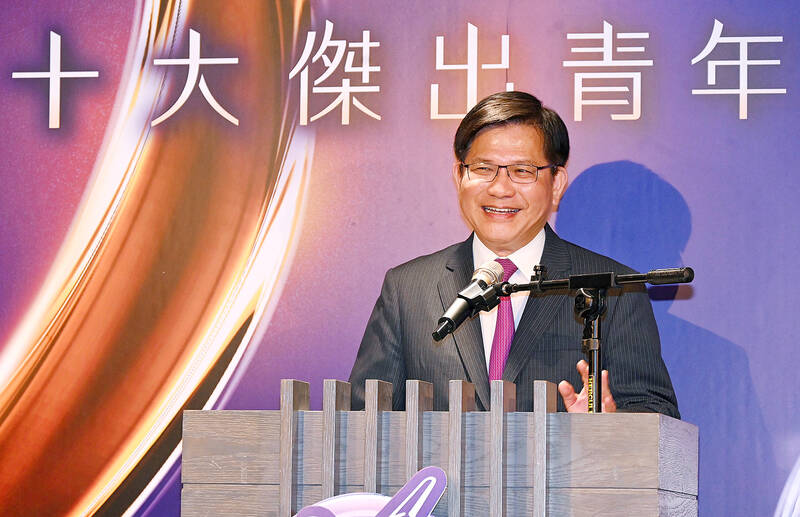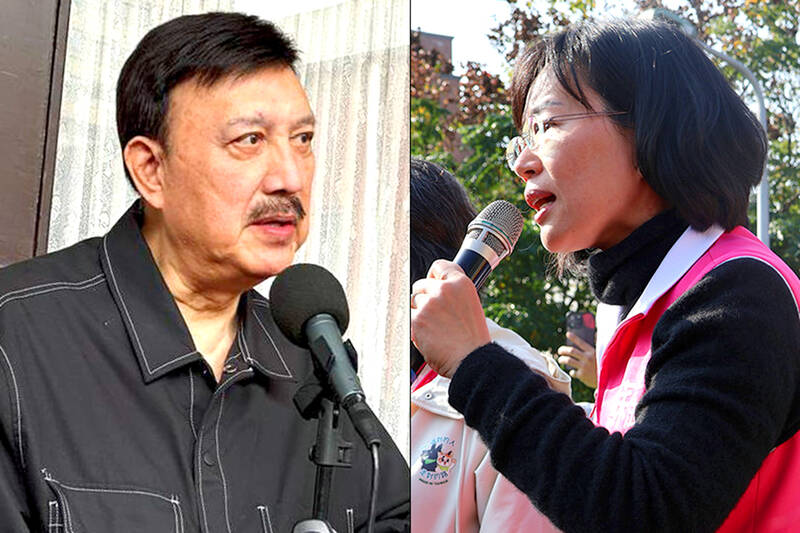The following three paragraphs are just some of what the local Chinese-language press is reporting on breathlessly and following every twist and turn with the eagerness of a soap opera fan. For many English-language readers, it probably comes across as incomprehensibly opaque, so bear with me briefly dear reader:
To the surprise of many, former pop singer and Democratic Progressive Party (DPP) ex-lawmaker Yu Tien (余天) of the Taiwan Normal Country Promotion Association (TNCPA) at the last minute dropped out of the running for committee chair of the DPP’s New Taipei City chapter, paving the way for DPP legislator Su Chiao-hui (蘇巧慧) of her father’s Su faction (named after former premier Su Tseng-chang, 蘇貞昌) to run unopposed with the local backing of New Tide and the Ing faction (named after, but not endorsed by, President Tsai Ing-wen, 蔡英文). This is widely seen as a potential setback for Minister of the Interior and former Keelung mayor Lin You-chang (林右昌) of the TNCPA and his rumored aspirations to run for mayor of New Taipei City in 2026 and a big win for the Su faction.
Across Taiwan 14 of the DPP local party chair races are being contested between factions, often with alliances differing in different localities. Much attention is being focused on Kaohsiung, which has a later registration date, but it is clear that the Chu subfaction of New Tide (named after Control Yuan President Chen Chu, 陳菊) will be running against an Ocean faction candidate now explicitly backed by the TNCPA.

Photo: Liu Hsin-de, Taipei Times
Meanwhile, as the incoming cabinet picks are being released, much attention is focused on the high number of members from New Tide and the “Tainan gang” and that the reported pick of Lin Chia-lung (林佳龍) as foreign minister is a sop to the TNCPA ...
HOW THE FACTIONS VANISHED IN ENGLISH
It is quite likely that none of that made much sense to many readers because the DPP factions are barely — if ever — mentioned in the English-language press. Those that understood the above three paragraphs either follow the local press in Chinese or have followed my past work where every couple of years I have revisited the topic with the latest developments. Those who have lived here since before roughly 2010 may have understood some of this and recognized New Tide and the Su factions, but all the other factions have changed considerably since then.

Photo: Taipei Times file photo
Despite their near-total absence from English-language media, both the DPP factions and the Chinese Nationalist Party’s (KMT) local patronage factions are big topics in the Chinese-language media because they are crucial for understanding how Taiwan’s politics function. We will examine the local patronage factions, which are largely but not exclusively associated with the KMT in a future column, because they function and operate quite differently.
Prior to roughly 2010, the English-language press did cover the DPP factions regularly, but after a quiet period and much change in the DPP factional landscape a problem appeared. Many English-language journalists are quite knowledgeable about the topic, but the problem has become that their readership would require a whole education on the subject for them to be able to refer to them, and that does not fit easily into a news article. This column and a follow-up piece are being written in hopes of providing local English-language journalists something to refer readers to so that reports including references to the factions can make a return.
THE FRACTIOUS YEARS
The DPP was unofficially declared a party in 1986 (officially registered as a party in 1989) and was made up of various groups advocating for democracy that had before been lumped under the term “outside of the party (ie, the KMT)” or dangwai (黨外). These groups had different ideologies, which even included pro-unification with China members at the time, and they formed into factions to maximize their influence and achieve unified goals. By the early 1990s, the pro-unificationists had left the party.
Early on these factions were more idealistic, but over time they have appeared to be more about power and patronage. During the administration of president Chen Shui-bian (陳水扁), factions formed around and were named after three of his premiers: Frank Hsieh (謝長廷), You Si-kun (游錫?) and Su Tseng-chang. The Su faction still exists.
The battles became very nasty, brutal and played out in the press like a political soap opera. That so much dirty laundry and infighting was happening in public was embarrassing to the DPP, and in 2006 the party officially banned the factions.
The factions all claimed they would disband, but none of them did. Instead, the effect of the ban was to make their internal workings even more secretive and opaque.
Though as far as I know the ban is still officially on the books in the DPP, nobody bothers to pretend they do not exist any longer. They openly talk to the press and even at times have held press conferences.
President-elect, party chair and the person who supposedly is ultimately entrusted to enforce the ban, William Lai (賴清德), publicly announced after being elected president that he would be resigning from New Tide. However, due to the opaque nature of the factions, it is uncertain what — if anything — this “resignation” means in practice.
TAMING THE FACTIONS
Following the DPP’s landslide loss in the 2008 election, a relatively unknown mid-level figure in the DPP boldly stepped forward and ran for party chair in hopes of being the first woman to lead the party. She won. Her name is Tsai Ing-wen, and excluding a few breaks, she ran the DPP until November of 2022, transforming the party along the way into a far more professional and less fractious entity.
Not coming from a faction herself, over time she began appointing faction members to party positions, and later government positions, in set percentages per faction roughly in line with each faction’s relative power. This meant that at the national level the factions knew roughly what they were going to get, which tamped down their vicious infighting, though they continued to war with each other at the local level.
There is some irony that a faction formed in the party during her tenure named themselves after Tsai, and is referred to as the Ing faction. Tsai has repeatedly called on them to change their name and has complained they never consult her or inform her of anything in advance.
In an upcoming column we will examine each of the factions, their role and the controversies surrounding the appointments announced for the incoming cabinet in the upcoming Lai administration.
Donovan’s Deep Dives is a regular column by Courtney Donovan Smith (石東文) who writes in-depth analysis on everything about Taiwan’s political scene and geopolitics. Donovan is also the central Taiwan correspondent at ICRT FM100 Radio News, co-publisher of Compass Magazine, co-founder Taiwan Report (report.tw) and former chair of the Taichung American Chamber of Commerce. Follow him on X: @donovan_smith.

US President Donald Trump may have hoped for an impromptu talk with his old friend Kim Jong-un during a recent trip to Asia, but analysts say the increasingly emboldened North Korean despot had few good reasons to join the photo-op. Trump sent repeated overtures to Kim during his barnstorming tour of Asia, saying he was “100 percent” open to a meeting and even bucking decades of US policy by conceding that North Korea was “sort of a nuclear power.” But Pyongyang kept mum on the invitation, instead firing off missiles and sending its foreign minister to Russia and Belarus, with whom it

When Taiwan was battered by storms this summer, the only crumb of comfort I could take was knowing that some advice I’d drafted several weeks earlier had been correct. Regarding the Southern Cross-Island Highway (南橫公路), a spectacular high-elevation route connecting Taiwan’s southwest with the country’s southeast, I’d written: “The precarious existence of this road cannot be overstated; those hoping to drive or ride all the way across should have a backup plan.” As this article was going to press, the middle section of the highway, between Meishankou (梅山口) in Kaohsiung and Siangyang (向陽) in Taitung County, was still closed to outsiders

President William Lai (賴清德) has championed Taiwan as an “AI Island” — an artificial intelligence (AI) hub powering the global tech economy. But without major shifts in talent, funding and strategic direction, this vision risks becoming a static fortress: indispensable, yet immobile and vulnerable. It’s time to reframe Taiwan’s ambition. Time to move from a resource-rich AI island to an AI Armada. Why change metaphors? Because choosing the right metaphor shapes both understanding and strategy. The “AI Island” frames our national ambition as a static fortress that, while valuable, is still vulnerable and reactive. Shifting our metaphor to an “AI Armada”

The Chinese Communist Party (CCP) has a dystopian, radical and dangerous conception of itself. Few are aware of this very fundamental difference between how they view power and how the rest of the world does. Even those of us who have lived in China sometimes fall back into the trap of viewing it through the lens of the power relationships common throughout the rest of the world, instead of understanding the CCP as it conceives of itself. Broadly speaking, the concepts of the people, race, culture, civilization, nation, government and religion are separate, though often overlapping and intertwined. A government